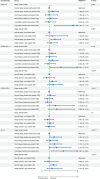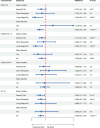The interaction between sleep patterns and oxidative balance scores on the risk of cognitive function decline: Results from the national health and nutrition examination survey 2011-2014
- PMID: 39729482
- PMCID: PMC11676575
- DOI: 10.1371/journal.pone.0313784
The interaction between sleep patterns and oxidative balance scores on the risk of cognitive function decline: Results from the national health and nutrition examination survey 2011-2014
Abstract
Background: Unhealthy sleep and exposures to oxidative factors are both associated with poor cognitive performance (PCP), but limited evidence has been found regarding the relationship between sleep patterns and oxidative factor exposures independently or jointly with the risk of PCP.
Methods: We analyzed data from 2249 adults aged ≥60 years in the National Health and Nutrition Examination Survey (NHANES) database (2011-2014). Self-reported questionnaires were used to collect data on sleep duration and sleep disorder, categorizing sleep duration into three groups based on responses: short (6 hours or less per night), normal (7-8 hours per night), or long (9 hours or more per night). Sleep disorder were categorized into two groups: sleep disorder, non-sleep disorder. Oxidative balance score (OBS) was calculated based on 20 oxidative stress exposures related to diet and lifestyle factors, with higher scores indicating greater antioxidant exposures. Survey-based multivariable adjusted regression analyses were conducted to examine the associations between sleep patterns or OBS alone and in combination with overall and PCP risks.
Results: Compared to the normal sleep duration group, the long sleep duration group had a higher risk of PCP (DSST<34) (OR = 1.91, 95% CI = 1.05-3.48, P = 0.021); while OBS was negatively correlated with the risk of PCP (DSST<34) [Q4 vs Q1 (OR = 0.50, 95% CI = 0.29-0.92, P = 0.004)]. There was an interaction effect between sleep patterns (sleep duration, sleep disturbances) and OBS on PCP (DSST<34) (P = 0.002). Further stratified analysis showed that in individuals with normal sleep duration, long sleep duration, or no sleep disturbances, antioxidant exposures, compared to pro-oxidant exposures, reduced the risk of low cognitive function occurrence.
Conclusions: In older populations, unhealthy sleep patterns (especially excessive sleep duration) and low OBS alone or in combination increase the risk of cognitive decline. Healthy sleep and lifestyle habits rich in antioxidant factors are crucial for protecting cognitive function in older adults.
Copyright: © 2024 Lou et al. This is an open access article distributed under the terms of the Creative Commons Attribution License, which permits unrestricted use, distribution, and reproduction in any medium, provided the original author and source are credited.
Conflict of interest statement
All authors declare no competing interests.
Figures


Similar articles
-
Interplay of sleep patterns and oxidative balance score on total cardiovascular disease risk: Insights from the National Health and Nutrition Examination Survey 2005-2018.J Glob Health. 2023 Dec 13;13:04170. doi: 10.7189/jogh.13.04170. J Glob Health. 2023. PMID: 38085249 Free PMC article.
-
Joint association of sleep patterns and oxidative balance score with all-cause and cardiovascular mortality among the general population.Front Nutr. 2025 Jan 29;12:1521123. doi: 10.3389/fnut.2025.1521123. eCollection 2025. Front Nutr. 2025. PMID: 39944955 Free PMC article.
-
Association of oxidative balance score with sleep quality: NHANES 2007-2014.J Affect Disord. 2023 Oct 15;339:435-442. doi: 10.1016/j.jad.2023.07.040. Epub 2023 Jul 11. J Affect Disord. 2023. PMID: 37442450
-
Association of the Oxidative Balance Score and Cognitive Function and the Mediating Role of Oxidative Stress: Evidence from the National Health and Nutrition Examination Survey (NHANES) 2011-2014.J Nutr. 2023 Jul;153(7):1974-1983. doi: 10.1016/j.tjnut.2023.05.014. Epub 2023 May 13. J Nutr. 2023. PMID: 37187352
-
Association between suicidal ideation and oxidative balance score (OBS): National Health and Nutrition Examination Survey (NHANES) 2005-2018.J Affect Disord. 2025 Feb 1;370:328-336. doi: 10.1016/j.jad.2024.11.010. Epub 2024 Nov 5. J Affect Disord. 2025. PMID: 39505022
References
MeSH terms
LinkOut - more resources
Full Text Sources
Medical

